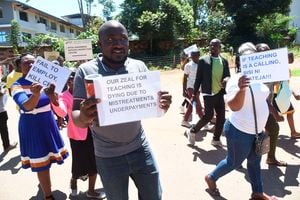Restrictive laws don’t prevent abortions; they make them more lethal

Every year, countless women lose their lives or suffer permanent physical and emotional trauma due to unsafe abortions.
What you need to know:
- As we mark International Safe Abortion Day, we must confront the harsh reality that restrictive laws and societal stigma are pushing women towards life-threatening methods of abortion.
- The annual cost of treating complications from unsafe abortions in Ksh533 million—could instead fund vital infrastructure like schools and health facilities.
- We urgently need comprehensive solutions, including dedicated reproductive health clinics, better training for healthcare workers, and implementation of comprehensive sexual education in schools.
Today marks International Safe Abortion Day and I find myself reflecting on the countless stories that have crossed my desk — stories of women and girls whose lives have been irrevocably altered by unsafe abortions. These aren’t just statistics; they're our sisters, daughters, friends, and neighbours. This issue touches the very core of our society's values and the health of our communities.
In Kenya, we find ourselves at a crossroads. Our Constitution, under Article 26(4), permits abortion only when a trained health professional deems it necessary for emergency treatment or when the mother's life or health is in danger. Yet, our Penal Code still threatens imprisonment for those who assist in procuring abortions. This legal contradiction has created a dangerous limbo, pushing desperate women into the shadows and toward unsafe methods.
Let me be clear; this is not about promoting abortion. It's about facing the reality that restrictive laws don’t prevent abortions; they only make them more dangerous.
Every year, countless women lose their lives or suffer permanent physical and emotional trauma due to unsafe abortions. The methods used — crude tools, harsh concoctions, and desperate measures — paint a horrifying picture of the lengths to which women will go when left with no other option.
What’s more distressing is the treatment these women face when seeking help. I've heard heart-breaking accounts of women being turned away from hospitals, sometimes by security guards at the gate, when presenting with post-abortion complications. This stigma and lack of compassion not only violates medical ethics, but also puts lives at risk. A woman who shows up bleeding needs immediate care, regardless of the cause.
Beyond the human cost, we must also consider the economic impact. The cost of treating complications from unsafe abortions in Kenya is estimated at Sh533 million annually. To put this in perspective, this amount could fund the construction of several public schools or significantly boost our healthcare infrastructure.
It's time we moved beyond judgment and towards compassion and practical solutions. The government should establish dedicated clinics for reproductive health services, including post-abortion care. These spaces would provide a safe, stigma-free environment for women to seek the help they desperately need. We must also invest in training healthcare workers in post-abortion care, especially in areas with few gynaecologists. No woman should be denied care or face discrimination because a clinician lacks the necessary skills or understanding.
At the heart of this conversation is the urgent need for comprehensive sexual education in our schools. We can't continue to bury our heads in the sand while our sons and daughters navigate life without the necessary knowledge to protect themselves. Sex education is not about encouraging promiscuity, as some argue, but about empowering our children to make informed choices. Knowledge is the most effective contraceptive, and educating young people about safe sex, contraception, and reproductive health will significantly reduce unwanted pregnancies and, by extension, abortions.
While at it, we need to reconcile our laws with the realities on the ground. The current legal framework creates confusion and fear, hindering access to essential healthcare services. It's time for a thoughtful review and update of our abortion laws to protect women's health and lives. We must break the silence surrounding abortion. By fostering open, non-judgmental conversations in our communities, we can reduce stigma and create support systems for women facing difficult decisions.
As we reflect on International Safe Abortion Day, let's challenge ourselves to move beyond entrenched positions and towards solutions that truly protect the lives and well-being of women and girls. This isn't just a women's issue — it's a societal issue that affects families, communities, and our nation's future. To those in positions of authority — I implore you to consider the real-life implications of our current approach. How many more lives must be lost or irreparably damaged before we act?
We should create a future where no woman is compelled to risk her life due to lack of options or fear of judgment. The path forward isn't easy, but it's necessary. Let this day serve as a catalyst for change — a reminder that behind every statistic is a human story, and that with compassion, education, and reform, we can write a new chapter for reproductive health in Africa and beyond.
Let's focus on solutions; better access to healthcare, comprehensive sexual education, and a society that respects a woman's right to make decisions about her own body without fear of punishment or shame. Women's lives depend on it, and so does our nation's prosperity.





